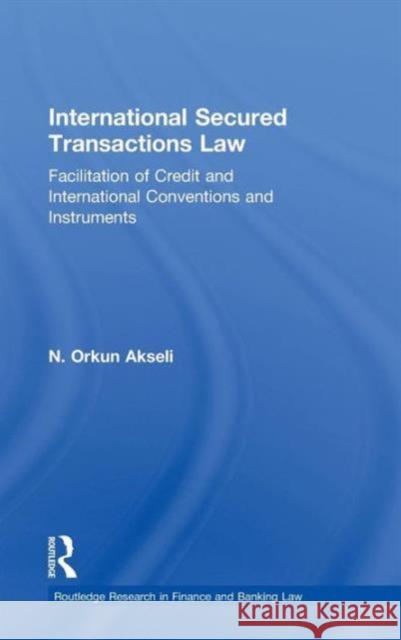International Secured Transactions Law: Facilitation of Credit and International Conventions and Instruments » książka
International Secured Transactions Law: Facilitation of Credit and International Conventions and Instruments
ISBN-13: 9780415488105 / Angielski / Twarda / 2009 / 344 str.
International Secured Transactions Law: Facilitation of Credit and International Conventions and Instruments
ISBN-13: 9780415488105 / Angielski / Twarda / 2009 / 344 str.
(netto: 792,97 VAT: 5%)
Najniższa cena z 30 dni: 730,42
ok. 22 dni roboczych.
Darmowa dostawa!
This book focuses on international harmonisation and the law of secured transactions by distilling and analysing the unifying principles of various significant international conventions and instruments such as the UN Convention on the Assignment of Receivables, the Unidroit Convention on International Factoring, the EBRD Model Law on Secured Transactions, the Unidroit Convention on the International Interests in Mobile Equipment and the UNCITRAL Legislative Guide on Secured Transactions. International secured transactions conventions and instruments facilitate credit and promote economic activity through the creation of harmonised rules. Therefore, given the increasing globalisation of markets, international reform efforts for the harmonised modernisation of secured transactions law have gained pace over recent years. International Secured Transactions Law draws on experiences in both English and US laws in order to identify and illustrate the existing problems that need to be addressed, as well as identify potential solutions. International Secured Transactions Law will be of interest to scholars, students interested in international commercial law, corporate law or comparative secured transactions, and practitioners involved in international commercial transactions.
This book examines international harmonisation and the law of secured transactions. International reform efforts to harmonise and modernise secured transactions law have gained pace with the globalisation of markets. Harmonised modernisation of secured transactions law is said to facilitate credit and promote economic activity by creating predictable rules. The book distils unifying principles of and considers relevant issues under international conventions on the assignment of receivables, international factoring, international interests in mobile equipment, EBRD Model Law on Secured Transactions, and the UNCITRAL Legislative Guide on Secured Transactions. The book makes comparisons of international instruments by using the English and US laws to identify and illustrate problems with the current systems that need to be addressed and offers possible solutions.











